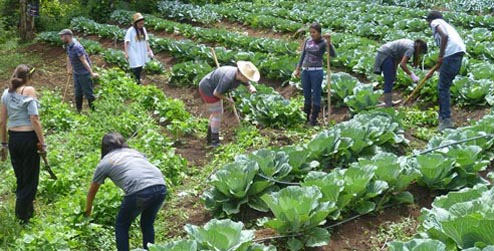Picture above; Carol-Anne on Day 1 of the ‘Living Below the Line’ challenge.
Quick introduction to Live Below the Line. It is a global cause which challenges those who join to live on a daily budget of £1 per day for 5 consecutive days. On this budget, you must buy all your groceries for the whole week. The idea is that by living below the world poverty line (World Bank estimate is actually £0.81/$1.25), we forgo privilege, spare a thought and raise awareness for people that live in extreme poverty.
This journey I am about to briefly describe is a brainchild of one of the dinner table discussions at the ICS Programme’s accommodation in Marcala, Honduras. For legal reasons (i.e the dispute among us over who actually came up with the plan), I’ll ask that you kindly allow me to skip the part that describes how four young people decided that attempting to take the Live Below The Line challenge in Honduras was a practical idea. It would be easier, if we had already successfully completed the challenge in the UK.
Every single local we spoke to assured us that living on 30 Lempira (£1) is way more difficult here, compared to the UK. It took me four hours of surviving on a banana to complete my Development Economics 101 lecture. My colleagues went further. Two days in, one day on the farm, the straw broke their proverbial camel’s back. To be frank, it wasn’t the final straw’s fault. Food is more expensive here. Of course our decision to quit was embarrassing, but even in our failure, we learnt a hard lesson. To about three million Hondurans, this is not a challenge, it is reality.
According to UNICEF, 22,000 children die each day due to poverty. They “die quietly in some of the poorest villages on earth…even more invisible in death”. These are not remote villages to us. I live in one of them. These are people I meet every week, to whom three-square meals are luxuries. These children belong to the likes of Alba, the woman who owns one of the small cabbage farms we work on. Single mother, dependent on the unstable demand for her crops, lacking electricity and access to clean water. To us, she is not just another UN statistic, she is a living, breathing representation of the irony of the global hunger. The world’s poorest people are the small farmers, tasked with the responsibility of feeding these remote communities.

Picture above; A day at Alba’s farm with Progressio volunteers.
One of my Hull University classmates put it quite succinctly. In describing our laissez-faire approach to world hunger, she said “I fear to ask God why there are still hungry people in the world lest he asks me the same“. Now I don’t have all the answers, but I know John F. Kennedy. I know he was laughed at when he promised to take his country to the moon in a decade. I also know his stance on world hunger. ‘We have the means; we have the capacity to eliminate hunger from the face of the Earth in our lifetimes. We only need the will’ he said. This was fifty years ago. Ending global hunger was a choice then. It still is.
Let us take the discussions on global hunger from our dinner tables to the global context.
Written by Lawerence Adebowale Gbadamosi



